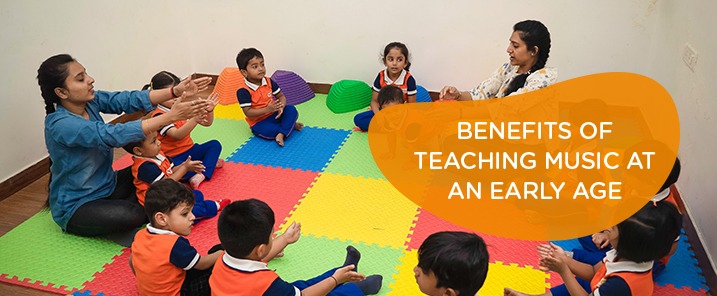Admissions Open For Yello 2024-2025 Limited SeatsContact Us: +918748995555
Admissions Open For Yello 2024-2025 Limited SeatsContact Us: +918748995555

Posted on 30 March 2020 by Admin |  3 min read
3 min read
Music and movement play an important role in our culture. We find music present in many aspects of our lives including theater, television, movies, worship, holidays, celebrations, and ceremonies. Right from the birth of the child, parents instinctively use music to calm down and soothe children, to express love and joy, and to engage and interact.
Music sparks all areas of child development including social-emotional, motor skills, language development, and improving memory skills. It also helps the body and mind to work together. Little ones often express themselves through music. Even young infants sway, bounce, or move their hands when they hear music. Many preschoolers listen to songs and then hum it to themselves while playing.
We, therefore, would like to highlight some of the most significant benefits of learning music at an early age and why it is crucial to encourage your kid to play musical instruments while growing up.
Following are some of the significant benefits of teaching your music to your little ones at an early age:
Enhances Concentration and Self-Confidence
Children who start learning music at an early age possess the potential to enhance their concentration power. This helps them to perform better at school due to their improved reading ability acquired at an early age, which also boosts their confidence. Good music requires good coordination of hands/eyes. For instance, reading music from the notes while having to find the correct keys on the piano simultaneously. Since music is meant to be performed, the courage to perform in front of fellow mates, friends, teachers, and family builds their self-confidence.
Improves Discipline and Teamwork
The value of hard work is a lesson that children should experience on their own. A routine time slot for practicing music is an honest discipline showing your kid that hard work leads to true benefits. As kids grow and learn to play a musical instrument, they begin to learn the discipline that is involved. Honing their singing skills takes hours of regular to practise with dedication and discipline to work on the piece repetitively. This discipline also implies to other domains of the child’s life. Kids improve their communication skills and team-building abilities by learning to interact with their peers who also share a common interest in learning music.
Boosts Academic Skills
Music can teach and reinforce many academic skills that kids are learning currently. Simple academic skills like learning alphabets through a song or learning rudimentary maths skills can be achieved through music at a young age. Also, patterns and counting lessons are important elements that can be taught through music education.
Developing Motor Skills
Depending on the age of the child, music imparts the opportunity to use both gross as well as fine motor skills to children. Some kids may engage in movement activities like jumping and turning around to music while others may implement fine motor skills to play an instrument. Either way, muscles are strengthened and connections are made with music being the key component. Learning how to play an instrument involves improving hand-to-eye coordination, ear-to-hand coordination as well as the fine motor skills required to tease a cymbal or tickle the ivories.
There are so many benefits to learning music at an early age. Children who are exposed to age-appropriate music activities and music lessons from childhood enjoy benefits in many other areas of their life. Love to learn music at an early age can be the greatest perk of all.
Back to Blog